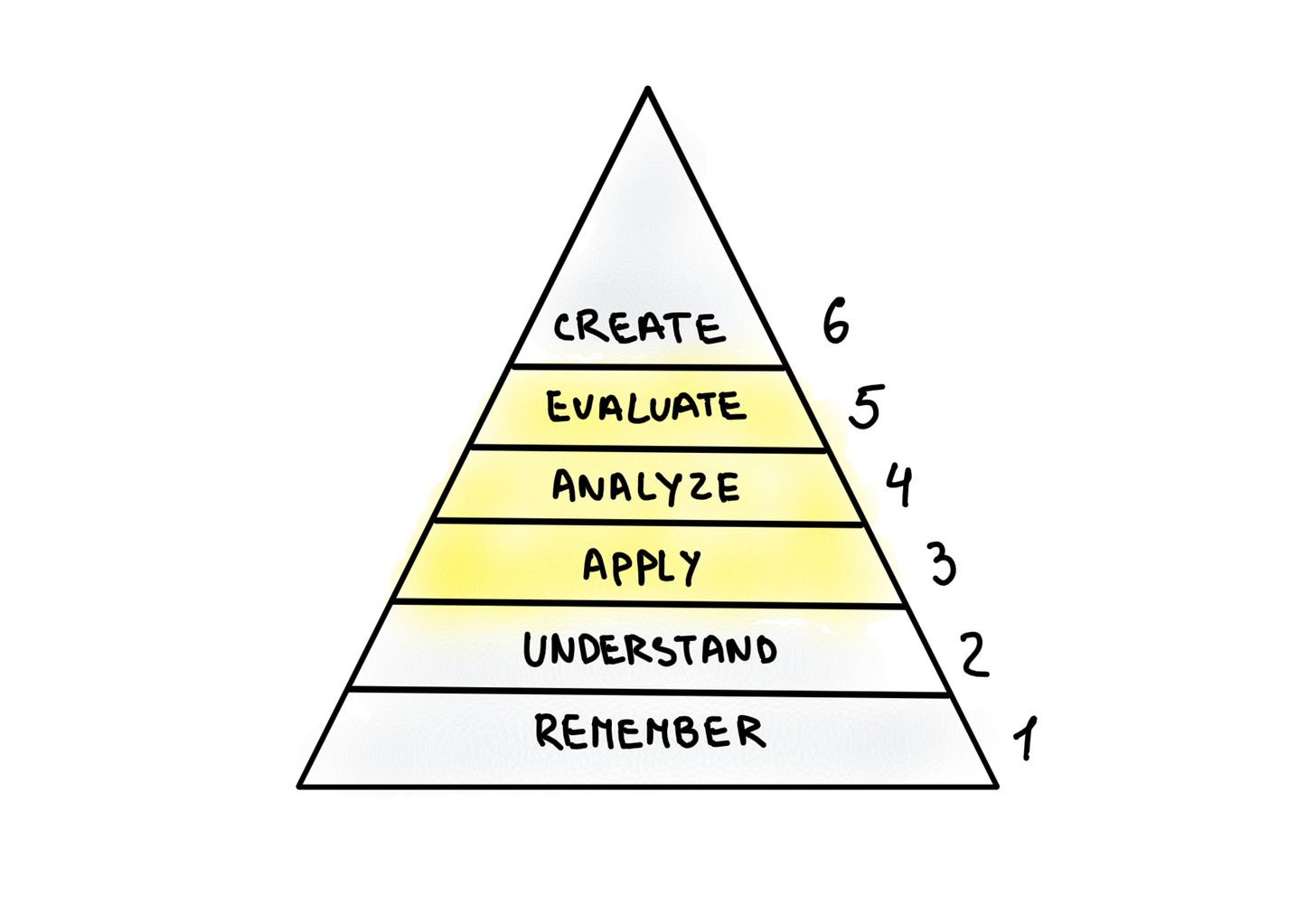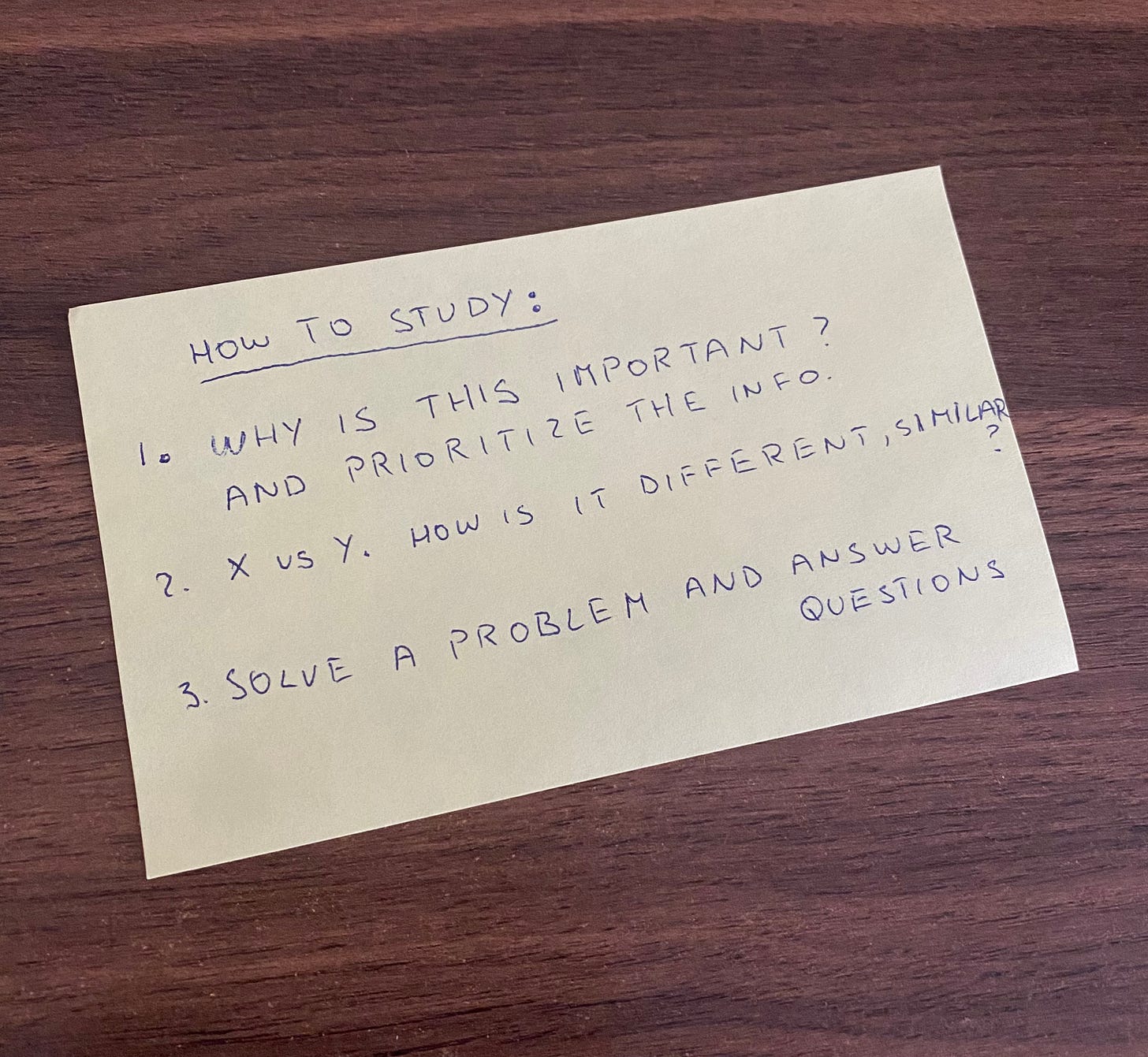Traditional learning is awfully bad.
You read, understand, and forget it about later. You re-read to understand again. Endless loop.
I researched how learning actually works. This system changed how I learn forever.
What I did first
I reviewed how I was already learning.
To know where to go, you must know where you are. So, I found out. Wrote down two questions to answer after every study session. Took less than a minute each time; nothing crazy.
“Did I try to remember the info?“
“Did I try to understand too much of it?”
These address the last two levels of the system. They’re the poison of learning. Bloom’s Taxonomy has 5 levels. You want to sit at the peak of the pyramid.
The fundamental idea that shapes the system
You learn from top to bottom. Level 5 to 3.
“But isn’t it better to build a strong foundation of knowledge and progress upward slowly?” I asked myself. To my surprise, no. Your brain fills in the lower levels automatically. It’s magic. If you still struggle, re-read only to get a firmer grip on the base—nothing more. Foundational understanding is critical (math, languages). But in most cases, skipping ahead to apply the info makes the foundation build itself faster.
Learn from bottom to top if you want to be inefficient.
My biggest tip (I’d outline this in red if I could):
Skim through the material. Get a rough understanding of it. And move down the ladder right away. Don’t wait till you “really understand it.” That’s a trap that will keep you studying for hours when you could’ve done it in one.
Let’s move down the ladder.
5 Justify
After you skimmed, you need to know why this concept is important.
You learn that you can use commas in writing to manipulate the pace of the sentence. So what? Why should I care? Because it’s hard to express pace through writing. When a person in a dark room opens the window blinds during daytime and the world rushes in with the bright blue sky with apartments and people chatting under it with slight bird-chirping sounds, it’s hard to expresses the suddenness of the moment if you let people take a slight break at every comma.
Now, in relationship to other concepts, you rank it.
Which is more important, controlling commas or writing in clear language? Probably the latter. So, you prioritize clear language. Is this more important than writing a great sentence? Well, writing a great sentence is actually a category. Clear language is a sub-category. Commas are a less-important subcategory of a great sentence.
Relationships start to form.
4 Evaluate
Now you put the concept in contrast to others to see how it fits.
What’s the difference between using no commas and using tons of commas? No commas make the reader rush through the sentence without a second for to pause. Everything is taken in at once. Tons of commas slow the moment down to the pace of a snail walk.
You touch the concept's boundaries when you find differences & similarities with others.
3 Apply
You have a good idea of what the concept is—now put it to use. Test yourself on the new info.
Here’s where the magic happens. When you learn top-down, you automatically fill in the gaps of the lower levers. The example I wrote with the open window was me practicing the concept.
Solve problems, answer quiz questions, create examples. Easy with ChatGPT. Ask it to test you → write down your answers → get feedback.
You stop here.
The bottom of the pyramid is a waste of time.
Level 1 is basic recall. You repeat facts, but that doesn’t mean you understand them. Level 2 is understanding. Sure, you can explain how something works, but it’s still surface-level knowledge. You only learn to regurgitate info; never actually use it yourself. These methods are passive; they don’t help you learn. You actively engage in levels 5-3 like you'd shape playdough—that’s why the learning sticks.
Don’t try to understand everything too well upfront. Jump straight to the top of the ladder. When you focus too much on the basics, you get stuck. It’s harder to climb up than run down the ladder.
Don’t re-read to remember. I never re-read unless I test myself first. If I can’t understand a concept through testing, I will re-read—but never before.
Here’s what I do every session
If you want to get better at learning, take action right now. The first step I took was to write down notes that I'd keep on my table at all times. I have here to this day. Otherwise, I’ll forget about it and stay at the bottom of the pyramid.
Why is this important? And prioritize the info.
X vs Y. How is it different from another concept? Or similar?
Solve a problem and answer questions.



